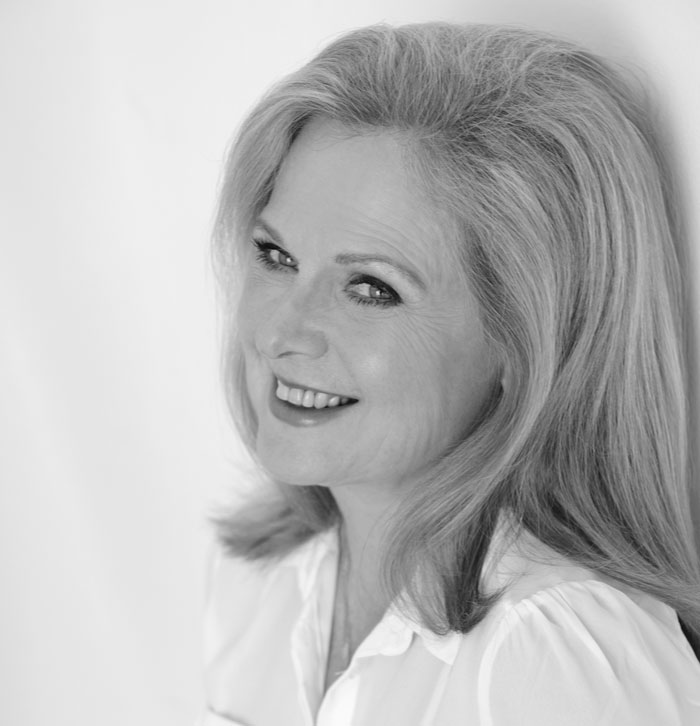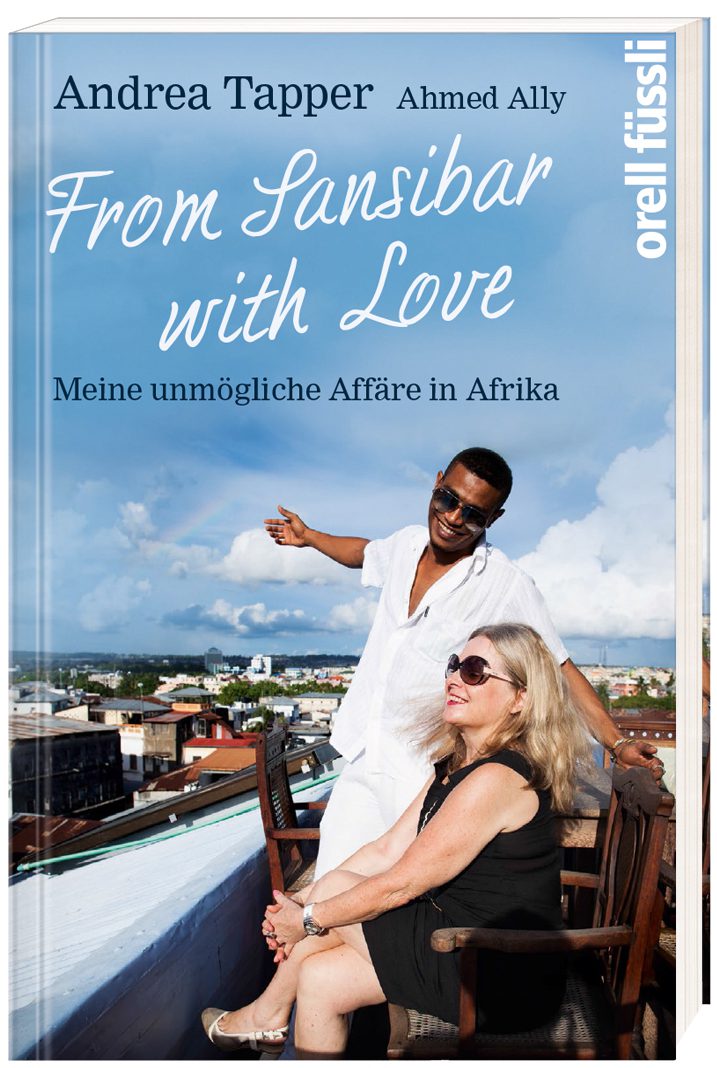Can Dündar: „You don’t belong here“

Strong global voices in Hamburg autumn 2018: Acclaimed Turkish journalist Can Dündar, 59, who had to flee his country and can presently not see his wife talks about his „Days in Exile“ in Germany. And: Hamburg moves mountains to assist refugee women finding jobs in the city

A free voice: Famous journalist Can Dündar from Turkey in exile in Germany – Photo: Tapper —– Photo above: Körber-Stiftung/ Claudia Höhne
It’s a phenomenon: Whenever I travel back from Zanzibar or my many other journeys, including Turkey, I am positively filled and happy about all the cultural diversity but also the urban commonness, the modern parallels in people, our civilised understanding. And then, when I see the hysteria and fear of certain German circles, including former intellectuals, I am astonished about their senseless anger.
Having said that, it is all the more encouraging to see the many efforts of Hamburg to integrate migrants and refugees. Thumbs up for the reputable „Körber-Stiftung“ (Koerber foundation), founded by German entrepreneur Kurt A. Körber in 1959. The foundation is based in Hamburg and Berlin and acts internationally. For this year’s „Days in Exile“ the Foundation organised 60 events in 48 locations in October and November mainly in Hamburg.
Can Dündar: „Outsider everywhere“
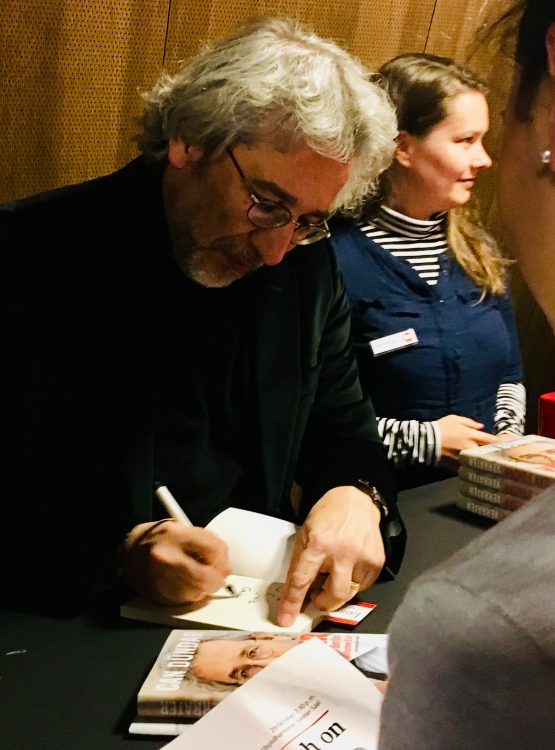
Sometimes resembling Richard Gere: Can Dündar signing books in Hamburg – Photo: Tapper
What an evening! Just one day after my return from Zanzibar, Can Dündar, 59, exiled Turkish journalist, speaks in Hamburg about life in exile and being a “perpetual outsider” – at home as abroad – when everybody says: “You don’t belong here.” Sometimes looking like Richard Gere, Dündar has become a living symbol of press freedom being diminished by the ultra-conservative turn-around in Turkey.
Syrian Expat Orchestra: Black cocktail dresses and homeland tunes

Syrerinnen im schwarzen Cocktailkleid: das Syrian Expat Symphonic Orchestra in Hamburg – Photo: Körber-Stiftung/ Claudia Höhne
29-strong Syrian Expat Philharmonic Orchestra plays after Dündars „Exile Speech“ at Elbphilharmonie – all organized by the fabulous, philanthropic Körber Foundation. The world-class musicians, after fleeing Syria, are spread out all over the world. Based in France, UK, Poland, Denmark, Saudi Arabia they “hardly find a chance to rehearse together”, pointed out Körber chairman Dr. Thomas Paulsen. The more recommendable and visibly appreciated by a sold-out Hamburg house that Körber gave them a platform to practice and to perform here.
Some of their moving tunes, classic and contemporary, were composed after the musicians – who performed in black cocktail dresses and suits – left their homeland. Within a short period after its founding in 2015, the Expart Orchestra is filling European concert halls and sending an elegant musical signal against war in Syria.
Challenging the mainstream, exile begins
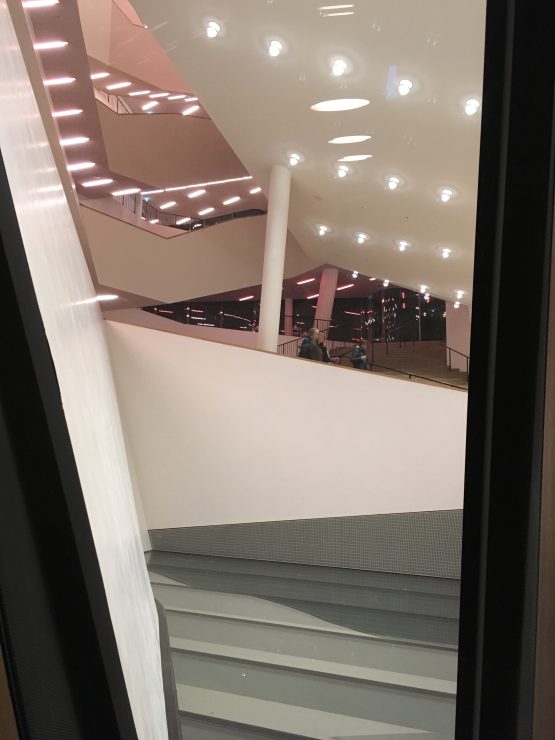
Top location for a top event: Elbphilharmony in Hamburg – Photo: Tapper
„My scars are inside“, said charismatic, grey-haired Dündar in a poetically moving 45-minute-speech in Hamburg. Had he expected the turn in Turkey, say, five years ago? „No“, he said, „and when we realised it, it was too late. What was shameful became normal. Intolerance grew.“
„When you challenge the mainstream your exile begins“, Dündar said – the „mental exile“ German philosopher Theodor Adorno often spoke about. „It’s that phase when you are called an outsider at home as abroad. You don’t belong here is the sentence you hear most often“, said Dündar, „even from your inner voice“.
„When politics enter your blood“
The most painful in exile? „Homelessness, licking one’s wounds in a strange land, everything becomes temporary, some become melancholic, some agressive“, Dündar compared his situation to the 65 million displaced worldwide. „Politics enter your blood“, he said, „as a writer you can’t write about, or are not wanted to write about anything else any more.“
The positive side of exile? „It opens new doors, creativity, frees you from peer pressure, is rejuvenating. ‚Exilish‘ becomes your new language.“
Living „in the rearview mirror“
„Its like driving a car looking into the rearview mirror all the time, while you have to adjust to an entirely new situation around and ahead you“, Dündar said.

„Perpetual outsider“ – Can Dündar, 59, Turkish exiled journalist. – Photo: Körber-Stiftung/ Claudia Höhne
Dündar’s is the classic case of censorship and curtailed press freedom: The prolific journalist was editor-in-chief of Turkish daily „Cumhuriyet“ until he published an investigative report about Turkish arms supply to Syria. He got arrested in 2016, and subsequently sentenced to five years for „espionage“. After an attempt to kill him, he managed to escape the country – by not returning from an assignment in Spain – and asked for exile in Germany. His wife is still in Turkey. Her passport was taken away by Turkish authorities so the couple cannot meet, except on social media.
History repeats itself: Under Hitler reign many German jews took refuge in Turkey.
Film maker Fatih Akin („Soul Kitchen“): „Dündar is my friend“
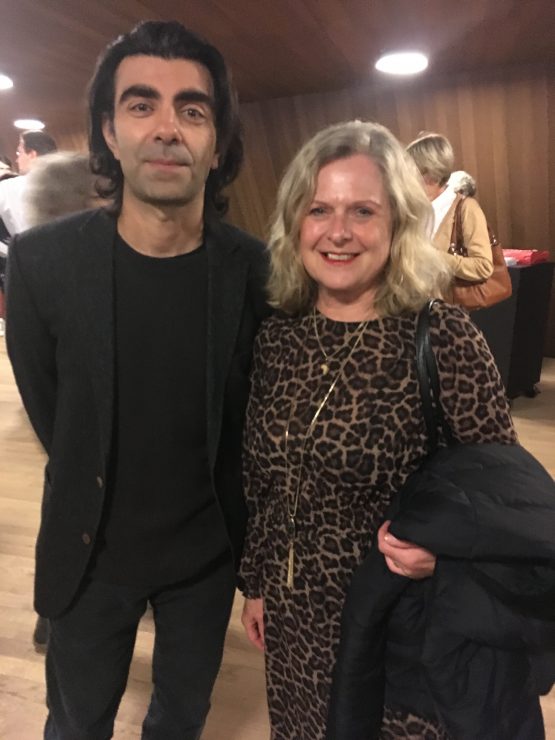
„Act of friendship“ – Journalist Andrea Tapper and filmmaker Fatih Akin in Hamburg – Photo:Tapper
I meet world-famous filmmaker Fatih Akin, a son of Turkish immigrants at home in Hamburg, in the lobby of the event at Elbphilharmony, the glitzy new concert hall in an old docks storehouse. He speaks to me in German: „I know and support Can Dündar as a colleague. It is an act of friendship.“
Körber-Stiftung also sponsored a forum on „Exile Journalism“ in Hamburg in the autum of 2018 with more than 120 partcipants. Topics: How can exiled journalist work in Germany? What are their job chances, what is their input, and what new topics have come-up with the wave of refuge immigrants? I talk to Yampier Duranoña, a young Rasta-haired journalist from Havanna who was able to enter German media through Hamburgs citizen radio/tv „Radio Tide“. He said: „Unlike in England or the US, the language barrier is obviously the biggest challenge for foreign journalists in Germany.“ – During the event at „Elphie“, Koerber Foundation chairman Dr. Thomas Paulsen demanded a full investigation into Jamal Kashoggis death, the critical journalist murdered in the Saudi Embassy in Turkey: “He was our friend, too”
W.I.R. – a big „We“ for refugee ladies
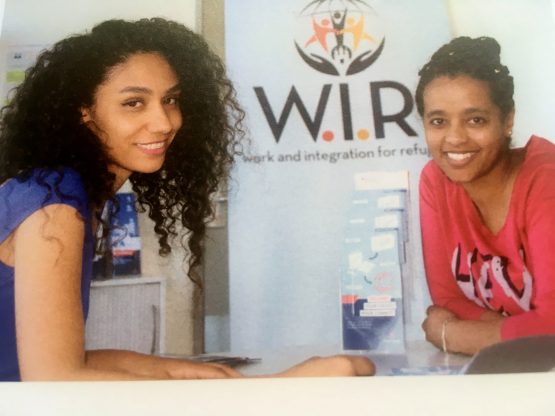
Helping refugee women to get jobs in Hamburg
A couple of days after the Dündar event I visit another „Days of Exile“ venture, a discussion of and for refugee women in Hamburg, organized by W.I.R., standing for „Work and integration for refugees“. W.I.R bundles up activites of 15 state and non-state organisations responsible for integration – a great initiative. Ms Petra Lotzkat, chief of social authority in city state Hamburg, presented the figures:
- 54 000 refugees mainly from Afghanistan, Syria, Iran and Irak now live in Hamburg in a population of 1,8 million people
- 60 percent men, 40 percent women is the ratio all over Germany in about 1 mio refugees, in Hamburg however there are less women, about one third
- Only 15 percent of the clients of W.I.R. are refugee women looking for a job, „but the number is growing“ says Ms Lotzkat
- Trend seems to be: first men back to work, then women
- 4000 refugess have been helped since 2014, about 1000 per year, thereof 150 women
Lady dentists and doctors – or „just“ refugees?

Getting acknowledged in their original profession is a big task for refugee women in Germany – Photo: W.I.R. initiative
The numbers may be small but efforts are big. Hamburg hospital Eppendorf offers internships for Syrian female (and male) doctors and nurses as a test of their possible approbation in Germany. So do other industries for other professions. Isa, a lady dermatologist from Syria and mother of two, managed to get her match-certificate in medicine after 3 years. Again: „Language was the biggest challenge“, she said.
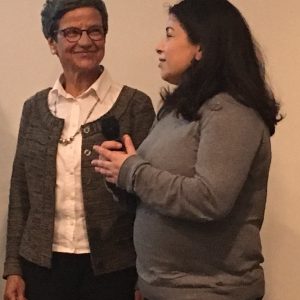
After 2 years acknowleged as a doctor in Germany: Isa from Syria (right) with city social services employee
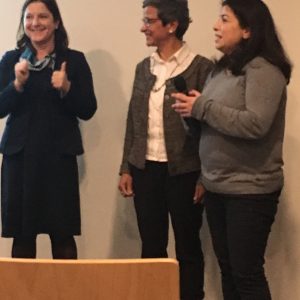
German women helping Syrian women: Social service employees (left and centre) with Syrian dematologist Isa (right)
Future system for legal immigration to Germany
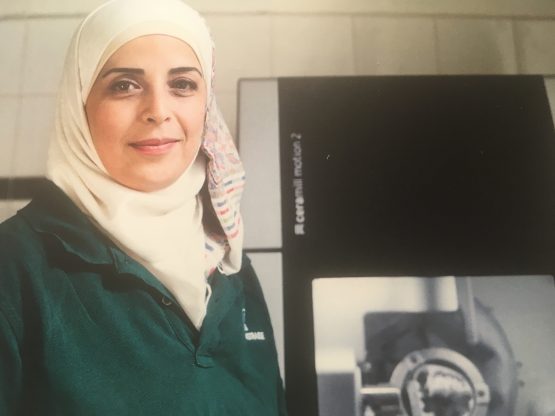
Was heading a dental lab in Damaskus: Wessal, 37, had to start afresh after fleeing to Hamburg – and succeeded
Another Syrian refugee, Wessal, was running her own dental lab in Damaskus with six employees when she had to flee the conuntry. Aged 37 she arrived in Hamburg in April 2014. Exactly 2 years later, in April 2016 she was accepted as a dental surgeon here.
„What we have established for refugees may well serve as a future system to put migrants into qualified and other jobs“, a representative of the social authority Hamburg said – a very good idea if and when Germany will finally pass its long-awaited legal immigration law.
Refugee kids are entitled to free Kindergarten in Germany – „a good chance for your kids to integrate early“, a city spokesman adressed the women. How to communicate these efforts? „I heard about it thru a Facebook group“, one of the refugee women said. Another tool of integration may as well be food: „Chickpeas“ is the name of an unusual catering service, founded and organized by Syrian and Afghan refugee women in Hamburg. Self-employed, it creates jobs for the refugee ladies – while making German food-lovers‘ diet more, well, diverse.
Information:
For interested women: Hamburg.Mitte-625-Vermittlung@arbeitsagentur.de
For companies: Hamburg.Unternehmensservice-WIR@arbeitsagentur.de


